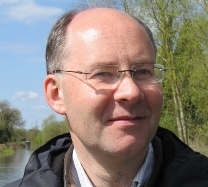Eclipse scientist wins physics medal for 'outstanding' contribution
Release Date 01 July 2016

An environmental physicist from Reading who organised the world's biggest eclipse experiment has won the 2016 Appleton Medal from the Institute of Physics.
Professor Giles Harrison, head of the University of Reading's Department of Meteorology, wins for his outstanding contributions and leadership in the field of atmospheric electricity.
The judges cited Professor Harrison's discovery of new global-scale atmospheric interactions - such as the discovery that the clouds around the world rise and fall daily with the earth's ‘electrical heartbeat'.
Professor Harrison was also praised for his leading public outreach on the meteorological effects of the solar eclipse of 2015.
Professor Harrison works at the intersection of several disciplines, including atmospheric physics, solar-terrestrial physics, aerosol science and nuclear physics.
As an experimentalist, he has developed novel measurements of clouds, turbulence, atmospheric electricity, cosmic rays, solar energetic particles, air ions and lightning - often carried out within the tight constraints on power, weight and telemetry on small balloon flights.
Professor Harrison has challenged the conception of atmospheric electricity as being a result of atmospheric dynamics, by revealing subtle feedback effects, such as unexpected effects on droplet growth or cloud properties. His work in this area has galvanised the international community and reinvigorated the subject.
Cloud charge
Further, Professor Harrison has established a theory for particle electrification, the Clement-Harrison theory, which is now independently verified and being used in the nuclear industry.
He has measured charge in liquid water and Saharan dust clouds, led the public outreach for meteorological effects of the 2015 solar eclipse, and published the first peer-reviewed measurements of the ash plume from the Icelandic volcano Eyjafjallajökull, having been asked to provide in-situ observations by the Cabinet Office - and his advice to the Met Office made the UK much better prepared for a repeat event.
'The IOP Awards recognise outstanding individuals and teams within our physics community' - Prof Roy Sambles
Professor Harrison is joint head of the Department of Meteorology, and a dedicated and very popular lecturer of undergraduate and postgraduate meteorological courses, with students keen to have him as their project supervisor. His many years of work in managing and improving the department's atmospheric observatory has made it a highly renowned facility for research and teaching in atmospheric physics.
During a 24-year research career, Harrison has authored or co-authored more than 150 peer-reviewed publications, is cited in more than 5,000 others, and has recently written a book on atmospheric measurement and instrumentation.
He was elected to the Academia Europaea in 2014, is a senior fellow of the Higher Education Academy, is on the executive board of Environmental Research Letters and has been an active member of the IOP's Environmental Physics Group.
President of the IOP, Professor Roy Sambles, said: "The IOP Awards recognise outstanding individuals and teams within our physics community, not only to celebrate their creativity, hard work and dedication but also to inspire others to strive to achieve excellence in what they do.
"The recipients represent some of the best and brightest minds involved with physics in academic and industrial research, in education and in outreach."
The IOP has been recognising exceptional physicists through their medals and awards since 1914.
